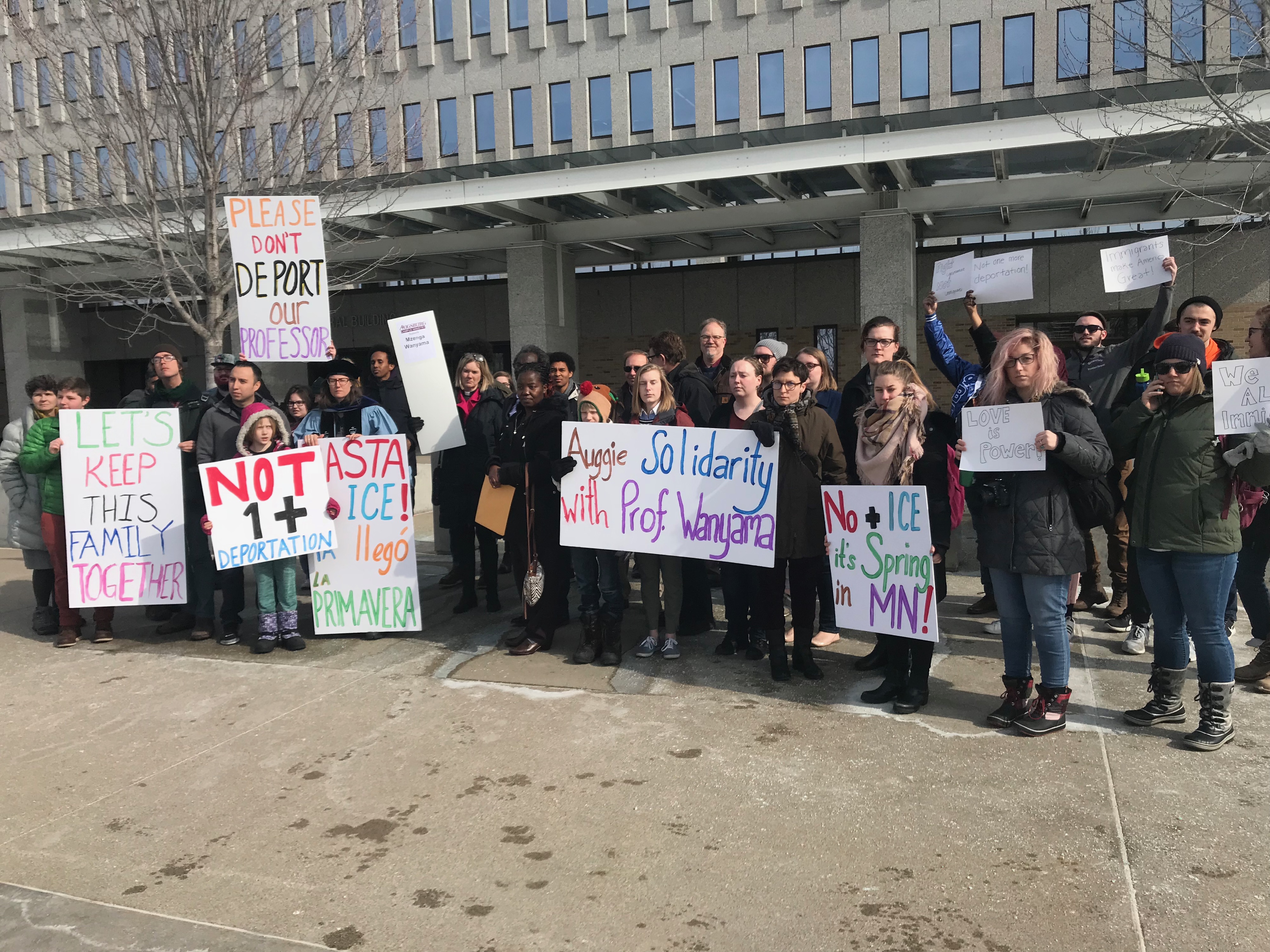

Share
Students, community based supporters, and Augsburg University faculty colleagues waited tensely outside of the Bishop Henry Whipple federal building to await news about the status of Professor Dr. Mzenga Wanyama.
Wanyama emerged to a cheering crowd.
Elected officials were invited to come and support Wanyama. None came. Mayor Jacob Frey’s office sent the following statement:
“Dr. Mzenga Aggrey Wanyama is a pillar in his community,” said Frey. “For over two decades he’s helped shape future leaders in Minneapolis and beyond – our city and our region are better for it. The federal government should focus on strengthening the bonds that hold our communities together, not tearing them apart.”
During Wanyama’s meeting with ICE officials, he was told that he would need to return in a month and in the meantime prepare to be deported. ICE officials also confiscated his passport, presumably to guarantee his compliance. Wanyama was accompanied by his wife, and two attorney’s provided by Augsburg.
At an impromptu press conference in front of his supporters, Wanyama stated forcefully, “I don’t know how to say thank you. I have never done anything to deserve this. This is really not about me but about how we can make things better.”
online pharmacy buy topamax no prescription pharmacy

In a moment of vulnerability, Wanyama described the sense of shame and embarrassment that he was wrestling with as he considered whether to be public about his immigration status.
“Some of these things aren’t easy to talk about. But I am wondering if that is a good strategy.” He mentioned that a colleague had joked about his immigration status causing him to be even more unwilling to speak up. It was a slow process for him to find the strength to seek help.
Wanyma explained that it was through conversations with colleague and supporter Political Science Professor Dr. Sarah Combellick-Bidney among others that he now understands that it is important to speak out to garner the support he was experiencing. “They aren’t going to detain me because if they do they know you will be here.”
Combellick-Bidney commented that ICE wants those in deportation proceedings to, “keep it private, they want people to feel shame and stigma so this [gathering of supporters] doesn’t happen.”
Finally, Wanyama lamented that “so many people don’t have the means or connections that I have.”
For students of color at Augsburg Wanyama has been their support as they face the challenges of pursuing higher education among a majority white student population. Two students articulated a sense of disorientation and devastation over the potential loss of Wanyama.
online pharmacy buy rogaine no prescription pharmacy

Augsburg junior Destyn Land explains,
“Since I have been there [Augsburg] there has kind of been a lack of support for Black students. And this is one of the only Black professors we have. So a lot of why I am here is because I never ever want to lose this professor.” He said, “Just his presence and the representation that he brings. His encouragement is inspiring to me, and I would truly hate to lose that.”
Fellow Augsburg junior Jhoseline Flores Castellanos explains that during her first Semester at Augsburg she struggled with her writing. It wasn’t until she took a course with Wanyama that her writing and outlook improved. “Professor Wanyama being an immigrant like I am, gave me the motivation to keep working hard, turning in drafts. He knows how hard it is and understood where I was coming from.“ She is now a social work major. The major is writing intensive which is no longer a barrier for her. Flores is proud to get consistently positive feedback for the quality of her writing.
Both students have already been facing the reality of ICE’s strategy of targeted disappearance. Land comments that “scrolling through my FB feed makes me mad as hell, cause its like I have friends who are at risk of being deported.” For some of these friends their family members have already been deported breaking up families and eroding the sense of community and stability necessary to pursue college and deal with an increasingly corrosive environment for people of color in the Trump era.
Flores argues that the targeting of a Black professor is a tactical move by ICE because “they do not want us people of color to succeed.”

